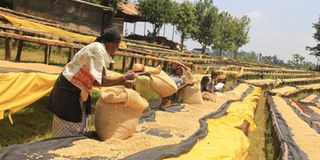Eight coffee factories face auction over Sh163m debt

Workers dry coffee parchment in readiness for processing at Rumukia Coffee Mills in Mukurwe-ini, Nyeri.
What you need to know:
- A forensic audit conducted last year showed that the loans were secured by land titles and coffee proceeds.
In the 2016/17 year, Cooperative Bank recovered Sh34 million Stabex funds from the society, necessitating more borrowing.
It’s Through Green Bell Auctioneers, Taifa Sacco seeks to seize farmers’ assets to offset the debts. The auctioneers have been instructed to cart away parchment worth Sh16 million, a weighing machine valued at Sh400, 000, a pulping machine and other office equipment that cost about Sh1.2 million.
Over the years, the management of the cooperative has been borrowing from lenders to pay farmers while selling their produce to offset loans.
Due to pay delays, a majority of farmers had already stopped delivering their produce to the factories. Some uprooted their coffee trees while others moved to better paying factories in other sub-counties.
Nestled within the rich red volcanic foothills of Mt Kenya, Rumukia was among the best paying societies in the county per kilogramme of coffee delivered, but chronic managerial problems drove away many members.
Forensic audit
Across the region, more than 700,000 smallholder farmers suffer woes that range from delayed payments, mismanagement and inefficiencies in co-operatives, restrictive laws, and high cost of production and lack of direct access to the coffee exchange trading floor.
A forensic audit conducted last year showed that the loans were secured by land titles and coffee proceeds.
“The county government should ensure the management committees strictly adhere to the procedures of borrowing and operate with properly approved borrowing powers as stipulated by the Cooperative Society rules,” the report stated.
It also recommended that cooperatives should operate within their means to avoid external borrowing. In Rumukia, they heavily relied on borrowing to pay farmers.
Coffee societies are expected to ensure that the borrowings are as per the approved budgets and within their ability to repay the loans, but most do not adhere to this directive.
At Rumukia, the management relied on borrowing year after year to pay farmers, and whenever the society received coffee proceeds, the lenders would recover all outstanding debts, leaving no money to pay the growers. This would force the management to borrow another loan.
Sh85 million
In the 2013/14 year, a miller owed the society more than Sh74 million for cherry and mbuni (unwashed coffee) while the cooperative owed farmers more than Sh85 million.
Instead of remitting the money to the society for coffee payments, Kenya Cooperative Coffee Exporters (KCCE) paid creditors (Sasini) Sh48 million and Kenya Cooperative Coffee Mills (KCCM) Sh25 million, leaving farmers empty.
In the 2016/17 year, Cooperative Bank recovered Sh34 million Stabex funds from the society, necessitating more borrowing.
In order to pay farmers for their produce, the society was forced to borrow more money from Taifa Sacco year after year, which has accumulated to millions of shillings.
Farmers have now threatened to stage demonstrations against the cooperative’s management.





